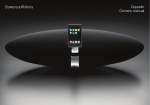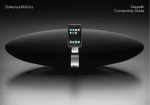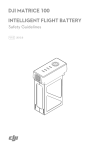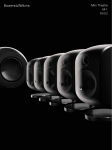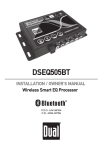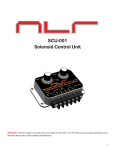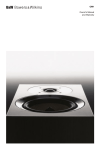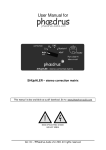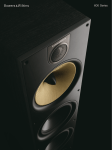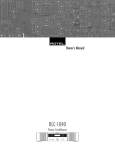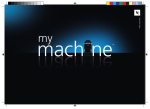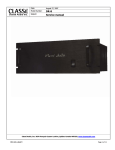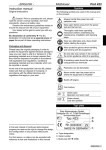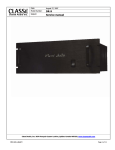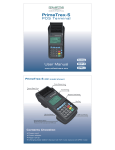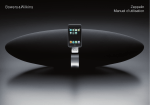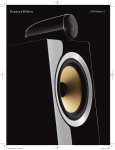Download 600 Series ASW608 ASW610 Owner`s Manual - E-HiFi
Transcript
600 Series ASW608 ASW610 Owner’s Manual &IGURE &IGURE 0ROCESSOR &RONT!MPLIFIER ,INE/UTPUTS 3UBWOOFER #ENTRE 2EAR )NPUT &RONT 3PEAKER/UTPUTS 2 , , 2 30%!+%23 #ENTRE#HANNEL!MPLIFIER )NPUT , 2 2EAR!MPLIFIER 3PEAKER/UTPUTS 2 , )NPUT 3PEAKER/UTPUTS 2 , , 2 30%!+%23 3UBWOOFER 30%!+%2 &IGURE &IGURE 0ROCESSOR 0ROCESSOR 3PEAKER/UTPUTS 3PEAKER/UTPUTS 3UBWOOFER &RONT 2 &RONT 2EAR , 2 2 , 2EAR , 2 , 30%!+%23 30%!+%23 3UBWOOFER 3UBWOOFER &IGURE &IGURE )NTEGRATED!MPLIFIER )NTEGRATED!MPLIFIER ,INE/UT 3PEAKER/UTPUTS 2 3PEAKER/UTPUTS , 2 30%!+%23 3UBWOOFER , 30%!+%23 3UBWOOFER Figure 7 Integrated Amplifier Line Level Outputs Speaker Outputs R L L R SPEAKERS Right Subwoofer Left Subwoofer Figure 8 Integrated Amplifier Outputs R L SPEAKERS Right Subwoofer Left Subwoofer Figure 9 Pre-Amplifier Line Out L Subwoofer R Power Amplifier Line In Speaker Outputs R L L R SPEAKERS Figure 10 Pre-Amplifier Line Out L Subwoofer R Power Amplifier Line In Speaker Outputs R L L R SPEAKERS Figure 11 Left Subwoofer Pre-Amplifier Line Out L R Power Amplifier Line In Speaker Outputs R L L Right Subwoofer R SPEAKERS Figure 12 Left Subwoofer Pre-Amplifier Line Out L R Power Amplifier Line In Speaker Outputs R L L Right Subwoofer R SPEAKERS English Owner’s manual IMPORTANT SAFETY INSTRUCTIONS CAUTION RISK OF ELECTRIC SHOCK DO NOT OPEN Caution: To reduce the risk of electric shock, do not remove the back panel. No user-serviceable parts inside. Refer servicing to qualified personnel. Explanation of Graphical Symbols: The lightning flash within an equilateral triangle is intended to alert you to the presence of uninsulated “dangerous voltage” within the product’s enclosure that may be of sufficient magnitude to constitute an electric shock to persons. The exclamation point within an equilateral triangle is intended to alert you to the presence of important operating and maintenance (servicing) instructions in the literature accompanying the appliance. WARNINGS: 1. Read these instructions. 2. Keep these instructions. 3. Heed all warnings. 4. Follow all instructions. 5. Do not use this apparatus near water. 6. Clean only with dry cloth. 7. Do not block any ventilation openings. Install in accordance with the manufacturer’s instructions. 8. Do not install near any heat sources such as radiators, heat registers, stoves, or other apparatus (including amplifiers) that produce heat. 9. Do not defeat the safety purpose of the polarized or grounding-type plug. A polarized plug has two blades with one wider than the other. A grounding type plug has two blades and a third grounding prong. The wide blade or the third prong are provided for your safety. If the provided plug does not fit into your outlet, consult an electrician for replacement of the obsolete outlet. 10. Protect the power cord from being walked on or pinched particularly at plugs, convenience receptacles, and the point where they exit from the apparatus. 2 11. Only use attachments/accessories specified by the manufacturer. 12. Use only with the cart, stand, tripod, bracket, or table specified by the manufacturer, or sold with the apparatus. When a cart is used, use caution when moving the cart/apparatus combination to avoid injury from tip-over. 13. Unplug this apparatus during lightning storms or when unused for long periods of time. 14. Refer all servicing to qualified service personnel. Servicing is required when the apparatus has been damaged in any way, such as power-supply cord or plug is damaged, liquid has been spilled or objects have fallen into the apparatus, the apparatus has been exposed to rain or moisture, does not operate normally, or has been dropped. 15. When replacement parts are required, be sure the service technician has used replacement parts specified by the manufacturer or have the same characteristics as the original part. Unauthorised substitutions may result in fire, electric shock or other hazards. 16. Check that there are no cables under the carpet that may be damaged by the spike feet. Do not walk the product on the spike feet as this may cause them to become detached from the cabinet and cause damage. Take care not to impale yourself with the spike feet. 17. For continued protection against fire hazard, use fuses only of the correct type and rating. Mains fuses are located inside the appliance as well as on its back panel. Replacement of the internal fuse should be entrusted to an authorised operative. User-replaceable fuse types are shown in the specification. 18. Isolation of the appliance from the power supply is by means of removal of the power cord from the rear of the appliance or removal of the power cord from the wall power outlet. Either the wall outlet or the rear of the appliance must remain freely accessible at all times while the apparatus is in use. 19. This product should be operated only from the type of power source indicated by the marking adjacent to the power cord entry. If you are not sure of the type of power supply to your home, consult your product dealer or local power company. 20. Do not overload wall outlets, extension cords or integral convenience receptacles, as this can result in a risk of fire or electric shock. 21. Magnetic fields – The product creates a stray static magnetic field. Do not place any object that may be damaged by this magnetic field (eg cathode ray tube televisions or computer monitors, audio and video tapes and swipe cards) within 0.5m (2 feet) of the appliance. The appliance may cause distortion of cathode ray tube images beyond this distance. LCD and Plasma screens are not affected. 22. Mounting – Do not place this product on an unstable stand, tripod, bracket or table. The product may fall causing serious injury and serious damage. Any mounting of the product should follow the manufacturer’s instructions. WARNING TO REDUCE THE RISK OF FIRE OR ELECTRIC SHOCK. DO NOT EXPOSE THIS APPARATUS TO RAIN OR MOISTURE. Do not expose the device to rain, use it near water or in damp or wet conditions, or place containers on it containing liquids which might spill into any openings. 2-channel audio systems. All audio installations require some thought in installation if they are to reach their full performance potential and this manual will guide you through the process. The subwoofer requires connection to the mains power supply, so it is important that you familiarise yourself with the safety instructions and heed all the warnings. Keep this manual in a safe place for future reference. The Subwoofer Connection and Control Panel (Figure 1) 1. Status indicator. 2. On, Auto, Stand-by switch. 3. Line-level input volume. 4. Speaker level input volume. 5. Low-pass filter frequency. 6. Low-pass filter selection switch. When setting up the device, make sure that the AC outlet you are using is easily accessible. If some trouble or malfunction occurs, immediately turn off the power switch and disconnect the plug from the outlet. Even when the power switch is turned off, electricity is still flowing to the product at the minimum level. When you are not using the device for a long time, make sure to unplug the power cord from the wall AC outlet. 7. Bass extension switch. Introduction 13. Mains input. Dear customer, Thank you for choosing B&W. Please read this manual fully before unpacking and installing the product. It will help you to optimise its performance. B&W maintains a network of dedicated distributors in over 60 countries who will be able to help you should you have any problems your dealer cannot resolve. Environmental Information B&W products are designed to comply with international directives on the Restriction of Hazardous Substances (RoHS) in electrical and electronic equipment and the disposal of Waste Electrical and Electronic Equipment (WEEE). The crossed wheelie bin symbol indicates compliance and that the products must be appropriately recycled or processed in accordance with these directives. Consult your local area waste disposal organisation for guidance on how to dispose of this equipment in a proper manner. Carton Contents Check in the carton for: 1 Mains cable 1 Accessory pack containing: 4 M6 spike feet 4 M6 rubber feet 4 Lock nuts (10mm across flats) Installation The subwoofer has been designed both for Home Theatre installations and to augment the bass performance of ‘full range’ speakers in 8. Equalisation switch. 9. Phase reverse switch. 10. 12V trigger input. 11. Line level input sockets (left and right). 12. Speaker level input binding posts (left and right). 14. External fuse holder. Subwoofer Applications The primary function of a subwoofer is to reproduce signals from an audio-visual processor Low Frequency Effects (LFE) channel. In addition, the processor may be configured to divert the low bass portion from some or all of the other channels and add it to the LFE information. This is usually done by selecting “small” loudspeakers in the processor set-up procedure. In 2-channel audio applications a subwoofer is used to extend the bass response lower than that provided by the satellite speakers. The subwoofer low-pass filter should be set so that the subwoofer takes over as the output of the satellite speakers falls. Subwoofer Positioning and Installation The ear poorly perceives the source location of low frequency sound so the position of subwoofers in the listening room is generally less critical compared to full-range speakers. However, best results are usually obtained if the subwoofer is placed between the left and right speakers or in the vicinity of one of them. If two subwoofers are used, it is best to put one near the left and one near the right speaker. Placing a subwoofer behind the listening position, even in multichannel surround sound installations, generally results in inferior imaging, but may be an acceptable compromise if domestic considerations dictate. As with all speakers, the proximity of room boundaries affects the sound of a subwoofer. Bass volume increases as more surfaces come into close proximity with the speaker. Unlike full-range speakers, however, 3 the overall system balance can be corrected by adjusting the volume level of the subwoofer. The more boost gained from the room, the lower the volume can be set and the less hard the subwoofer has to work; but there is a down side. Subwoofers positioned near corners often generate more low-frequency room resonances, making the bass more uneven with frequency. There is no substitute for experiment as all rooms behave differently, so the subwoofer should be tried in a variety of positions before a final decision is made. A piece of music with a bass line ascending or descending the musical scale is useful for assessing the smoothness of the bass response. Listen for exaggerated or quiet notes. connections are made or broken. The subwoofer can accept both line level signals via the RCA Phono sockets (Item 11 in Figure 1) and speaker level signals via the binding posts (Item 12 in Figure 1). Use the following guide to select the appropriate connection method for your installation: • using line-level inputs: Figure 3 If the subwoofer is to be used in a confined space (e.g. built into furniture), the space must be ventilated to allow sufficient air to circulate and cool the unit. Ask your dealer for advice. • using speaker level inputs: Figure 4 The subwoofer is intended to be floor mounted only. It is important to ensure the subwoofer stands firmly on the floor using the spike feet supplied whenever possible. The spike feet are designed to pierce carpet and rest on the floor surface. Initially, screw the lock nuts onto the spikes enough to leave the nuts floating just above the carpet when the spikes are resting on the floor beneath. Screw the spikes fully into the threaded inserts in the base of the cabinet. If the cabinet rocks when placed on the floor, unscrew the two spikes that do not touch the floor until the cabinet rests firmly without rocking. Finally, lock the nuts against the cabinet. It may be more convenient to fit and adjust the spike feet after speaker positioning has been optimised. If there is no carpet and you wish to avoid scratching the floor surface, use either a protective metal disc (a coin perhaps) between the spike and the floor or use the supplied rubber feet. Fit the rubber feet by screwing one into each of the holes in the underside of the cabinet. The grille fitted to the front of the subwoofer may be removed if desired. Take care however not to touch the moving parts of the drive unit as damage may result. Using Multiple Subwoofers Using multiple subwoofers in a single installation can improve performance in the following ways: • Maintain stereo separation to the lowest frequencies. • Smooth out the effects of low frequency room resonances. • Enable a higher maximum sound output. In the case of two subwoofers used in a 2-channel audio system, stereo separation will only be improved if each channel has its own subwoofer located close to the appropriate satellite speaker. Electrical Connections Disconnect all audio system equipment from the mains until the signal connections have been made and checked. This avoids the risk of damage whilst 4 Application: Home Theatre Subwoofer connected to AV Processor with separate power amplifiers: Figure 2 Subwoofer connected to AV Processor with integrated power amplifiers: Note: The subwoofer is always better connected via its line level inputs in home theatre applications. Application: 2-channel audio Subwoofer connected to Integrated Amplifier: • using line-level inputs: Figure 5 • using speaker level inputs: Figure 6 Two Subwoofers connected to Integrated Amplifier: • using line-level inputs: Figure 7 • using speaker level inputs: Figure 8 Subwoofer connected to Pre/Power Amplifier: • using line-level input: Figure 9 • using speaker level inputs: Figure 10 Two Subwoofers connected to Pre/Power Amplifier: • using line-level inputs: Figure 11 • using speaker level inputs: Figure 12 Before Auditioning Before auditioning your new subwoofer installation and fine-tuning it, double check the connections. Make sure in particular that: 1. The phasing is correct. If the speaker level inputs are used, ensure that the positive terminals on the subwoofer (marked + and coloured red) are connected to the positive output terminals on the amplifier and that the negative terminals on the subwoofer (marked – and coloured black) are connected to the negative output terminals on the amplifier. Incorrect connection can result a confused sound with poor bass. 2. Left to right channels are not confused. Left/right confusion can result for example in orchestral elements appearing in the wrong place in the stereo image, or Home Theatre sound effects not matching the action on screen. Switching On and Off Subwoofers are best switched on after any other item and switched off first. The On/Auto/Standby switch (Item 2 in Figure 1) and Status Indicator (Item 1 in Figure 1) operate as follows: On: With the switch to On, the subwoofer will remain fully active and the indicator will glow green. Auto: With the switch set to Auto, the subwoofer will initially become fully active and the indicator will glow green. After about 5 minutes without an input signal, the subwoofer will automatically enter “sleep” mode. The indicator will glow red. When an input signal is detected, the subwoofer will automatically become active and the indicator will glow green. The subwoofer will return to sleep after about 5 minutes with no input signal. Audio-visual processors incorporating an “automatic” set up procedure may be “confused” by subwoofers with an auto switch-on/sleep function. A potentially damaging fault condition can arise. Subwoofers are best left switched on and fully active during set up if such a processor is used. channel level controls in the THX® controller should be used. In all cases the levels should be set to obtain 75dB SPL (C-weighted) at the listening position from the controller’s internal noise test signal. With other processors, configure the front and surround speakers to “large” or “small” as appropriate before setting the levels. Use the internal noise test signal and volume controls of the processor to set the levels of all the speakers. Only change the VOLUME control on the subwoofer if there is not enough range in the processor to achieve the correct levels. Inexpensive sound level meters are readily available from electronics stores and can be used to calibrate the levels. Refer to your processor manual for further details on how to set the levels. Standby: With the switch set to Standby the subwoofer will become active when 12V is applied to the Trigger Input (Item 10 in Figure 1). Zero volts at the input will return the subwoofer to sleep. The indicator will glow green when the subwoofer is active and red when the subwoofer is in sleep. 2-channel Audio Settings Setting The Subwoofer Controls Set the PHASE switch initially to 0°. There are 7 controls to consider: Set the VOLUME (LINE or SPEAKER) control initially to the 9 o’clock position. Set the LOW-PASS FILTER switch to IN. Set the EQ switch initially to position A. • The VOLUME (LINE) control (Item 3 in Figure 1) • The VOLUME (SPEAKER) control (Item 4 in Figure 1) • The LOW-PASS FREQ (frequency) control (Item 5 in Figure 1) • The LOW-PASS FILTER switch (Item 6 in Figure 1) • The BASS Extension switch (Item 7 in Figure 1) Set the LOW-PASS FREQ control to match the -6dB low frequency cut-off frequency of the satellite speakers. Note: Both -3dB and -6dB figures can be found in the specification of each B&W speaker model. If the satellite speaker manufacturer quotes only a -3dB frequency, the optimum setting for the LOW-PASS FREQ control should be between 0.6 and 0.9 times that figure. The more gradual the low frequency roll-off of the satellite speakers, the lower the frequency should be set. • The EQ (equalisation) switch (Item 8 in Figure 1) See the Fine Tuning section for more. • The PHASE switch (Item 9 in Figure 1) Fine-tuning The appropriate settings depend on the equipment used with the subwoofer and the modes of connection. If using more than one subwoofer, ensure the controls on each one are set the same. Note: The VOLUME (LINE) and VOLUME (SPEAKER) controls only operate on their respective line and volume inputs. An unused volume control is best set to Min. Home Theatre Settings Set the VOLUME (LINE or SPEAKER) control initially to the 9 o’clock position. Set the LOW-PASS FILTER switch to OUT. Set the EQ switch initially to position A. Set the PHASE switch initially to 0°. Set the LOW-PASS FREQ (frequency) control to 140 if the speaker level inputs are used. The setting is irrelevant if the line level inputs are used. See the “Fine Tuning” section for more. The subwoofer is not a THX® licensed component, but may be used with a THX® controller if desired. If a THX® controller is used, ensure that the subwoofer function is enabled. This incorporates all the filtering and level setting required for the subwoofer in all modes. For level calibration, the internal test noise and Home Theatre In home theatre systems, the subwoofer (LFE) signal is a separate channel rather than an extension of the signal to the satellite speakers. The LOW-PASS FILTER is switched out (or set to maximum), because the processor provides all the filtering for any speakers set to “small”. However, the position of the PHASE switch must still be assessed. Normally the phase will be set to 0°, but if the subwoofer is positioned at a distance significantly different from the other speakers, or the power amplifier driving the other speakers happens to invert the signal, the 180° position may be preferable. Listen with the switch in both positions and choose the one that gives the fullest sound. If there is little difference, leave the switch at 0°. Surround sound processors normally have a calibrated noise signal that can be used to set the relative levels of all the speakers, making the task somewhat more straightforward than for 2 channel audio. However, do not be afraid to alter the settings to your personal preference. It is all too easy to get carried away with the capabilities of the subwoofer, especially with some special low-frequency effects. Often a more realistic portrayal, and one more satisfying in the long term, is to be had by setting the subwoofer level lower than the standard calibration level. 5 2-channel Audio Set the system up in the preferred position and play some programme with a steady bass content. The optimum settings of the PHASE switch and the LOW-PASS FREQ control are inter-related and also dependent on the low-frequency cut-off characteristic of the satellite speakers. However, the settings recommended above for the LOW PASS FREQ control and PHASE switch have been chosen to integrate well with most satellite speaker bass alignments. Using the initial settings, first check the setting of the PHASE switch. Choose the option that gives the fullest sound. Normally the recommended option will be optimum, but may not be in certain circumstances. These may be that the power amplifiers feeding the satellite speakers invert the signal or that the subwoofer is not placed close to the satellite speakers. Next, adjust the VOLUME (LINE or SPEAKER) of the subwoofer relative to the satellite systems to your liking. Use a wide variety of programme material to get an average setting. A setting that sounds impressive on one piece may sound overpowering on another. Listen at a realistic volume level as the perception of musical balance varies with sound level. Finally, adjust the LOW-PASS FREQ control to give the smoothest transition between the subwoofer and satellite speakers. All Applications The BASS EXTENSION switch offers three options of subwoofer bass extension. Position A gives the greatest extension and position C gives the least extension. Position B provides a compromise setting. If the system is to be used at very high volume levels or in a large listening room, restricting the bass extension by selecting either B or C may help ensure that the subwoofer is not asked to exceed its performance limits. In most situations the BASS EXTENSION switch should be left in position A. The EQ switch alters the subwoofer bass roll-off alignment. The bass you hear is a combination of the subwoofer plus the effects of the room and you should choose the position that best complements your room and the location of the subwoofer. Position A gives a “drier” alignment, more suited to placing the subwoofer in a corner or compensating for a resonant room. Position B is suited to a less resonant room acoustic and use away from a corner. If you get problems with uneven bass – certain bass notes are exaggerated more than others – then you probably have a room interface problem and it is worth experimenting with the location of the subwoofer. What may seem like small changes in position – 15cm (6in) or so – can have a profound effect on the sound. The use of multiple subwoofers can smooth the effects of room resonances, as each subwoofer will tend to excite resonances at different frequencies. If you appreciably alter the relative distances from the subwoofer(s) and satellite speakers to the listening position, re-assess the PHASE switch setting. You should also check the volume of the subwoofer (using 6 either the processor output levels or the VOLUME control on the subwoofer amplifier as appropriate), but only after setting the phase correctly. Aftercare The cabinet surfaces usually only require dusting. If you wish to use an aerosol or other cleaner, remove the grille first by gently pulling it away from the cabinet. Spray aerosols onto the cleaning cloth, not directly onto the product. Test a small area first, as some cleaning products may damage some of the surfaces. Avoid products that are abrasive, or contain acid, alkali or anti-bacterial agents. Do not use cleaning agents on the drive unit. The grille fabric may be cleaned with a normal clothes brush whilst the grille is detached from the cabinet. Avoid touching the drive unit, as damage may result. Switch off the subwoofer before cleaning. Do not use the subwoofer as a table. When in use, objects left on top of the subwoofer are liable to rattle. In particular, avoid the risk of liquids being spilled (e.g. from drinks or vases of flowers). If the system is taken out of use for a long period, disconnect the subwoofer from the mains supply. Limited Warranty This product has been designed and manufactured to the highest quality standards. However, if something does go wrong with this product, B&W Group Ltd. and its national distributors warrant free of charge labour (exclusion may apply) and replacement parts in any country served by an official B&W distributor. This limited warranty is valid for a period of five years from the date of purchase or two years for electronics including amplified loudspeakers. Terms and Conditions 1 The warranty is limited to the repair of the equipment. Neither transportation, nor any other costs, nor any risk for removal, transportation and installation of products is covered by this warranty. 2 This warranty is only valid for the original owner. It is not transferable. 3 This warranty will not be applicable in cases other than defects in materials and/or workmanship at the time of purchase and will not be applicable: a. for damages caused by incorrect installation, connection or packing, b. for damages caused by any use other than correct use described in the user manual, negligence, modifications, or use of parts that are not made or authorised by B&W, c. for damages caused by faulty or unsuitable ancillary equipment, d. for damages caused by accidents, lightning, water, fire heat, war, public disturbances or any other cause beyond the reasonable control of B&W and its appointed distributors, e. for products whose serial number has been altered, deleted, removed or made illegible, f. if repairs or modifications have been executed by an unauthorised person. 4 This guarantee complements any national/regional law obligations of dealers or national distributors and does not affect your statutory rights as a customer. How to claim repairs under warranty Should service be required, please follow the following procedure: 1 2 Français Manuel d’utilisation IMPORTANTES INSTRUCTIONS CONCERNANT LA SÉCURITÉ If the equipment is being used in the country of purchase, you should contact the B&W authorised dealer from whom the equipment was purchased. If the equipment is being used outside the country of purchase, you should contact the B&W national distributor in the country of residence who will advise where the equipment can be serviced. You can call B&W in the UK or visit our web site to get the contact details of your local distributor. To validate your warranty, you will need to produce the warranty booklet completed and stamped by your dealer on the date of purchase. Alternatively, you will need the original sales invoice or other proof of ownership and date of purchase. CAUTION RISK OF ELECTRIC SHOCK DO NOT OPEN Attention : Pour réduire le risque d’électrisation, ne pas démonter l’appareil. Il n’y a aucun élément susceptible d’être modifié par l’utilisateur à l’intérieur. Adressez-vous toujours à un technicien agréé. Explication des symboles graphiques : L’éclair dans un triangle équilatéral indique la présence interne de tensions électriques élevées susceptibles de présenter des risques graves d’électrocution. Le point d’exclamation dans un triangle équilatéral indique à l’utilisateur la présence de conseils et d’informations importantes dans le manuel d’utilisation accompagnant l’appareil. Leur lecture est impérative. PRÉCAUTIONS IMPORTANTES : 1. Lisez ce manuel d’utilisation. 2. Conservez soigneusement ce manuel. 3. Respectez soigneusement tous les avertissements de sécurité. 4. Suivez les instructions de fonctionnement. 5. Ne pas utiliser cet appareil près d’une source humide. 6. N'utiliser qu'un chiffon doux et sec pour le nettoyage. 7. N’obstruez aucune des ouïes de ventilation prévues sur l’appareil. Respectez les conseils d’installation donnés par le constructeur. 8. Cet appareil doit être placé loin de toute source importante de chaleur, telle que cheminée, radiateur, etc., ou même les amplificateurs de puissance dégageant aussi beaucoup de chaleur. 9. Ne jamais démonter ou modifier une prise d'alimentation secteur intégrant une sécurité particulière. Une prise polarisée possède deux lames de contact, l'une plus large que l'autre. Une 7 ASW608 Description Active closed-box subwoofer system Drive unit 1x ø200mm (8 in) paper/Kevlar® cone long-throw Frequency range -6dB at 23Hz and 25/140Hz adjustable (EQ at A) Frequency response Bass extension Amplifier ±3dB 32Hz - 40/140Hz adjustable (EQ at A) -6dB at 23Hz (position A) -6dB at 28Hz (position B) -6dB at 36Hz (position C) Power output: Rated power consumption: Input impedance: Signal / noise: Functions: Inputs: Low-pass filter Dimensions Net weight 200W 40W / 0.5W standby 33kΩ >90dB Volume level - line in Volume level - speaker in Low-pass filter frequency - line in only Low-pass filter bypass Bass extension Bass roll-off alignment Auto sense on/standby Phase switch Line in (RCA Phono) Speaker in (Binding post) 12v trigger (3.5mm jack) Active 4th-order, variable cut-off frequency Height: Width: Depth: 260mm (10.2 in) not including feet 260mm (10.2 in) 330mm (13 in) including grille and controls 8.85kg (19.5 lb) 91 II11419 Issue 5 B&W Group Ltd Dale Road Worthing West Sussex BN11 2BH England T +44 (0) 1903 221800 F +44 (0) 1903 221801 [email protected] www.bowers-wilkins.com B&W Group (UK Sales) T +44 1903 221 500 E [email protected] B&W Group North America T +1 978 664 2870 E [email protected] B&W Group Asia Ltd T +852 2 869 9916 E [email protected] Kevlar is a registered trademark of DuPont. Nautilus is a trademark of B&W Group Ltd. Copyright © B&W Group Ltd. E&OE Printed in China.













